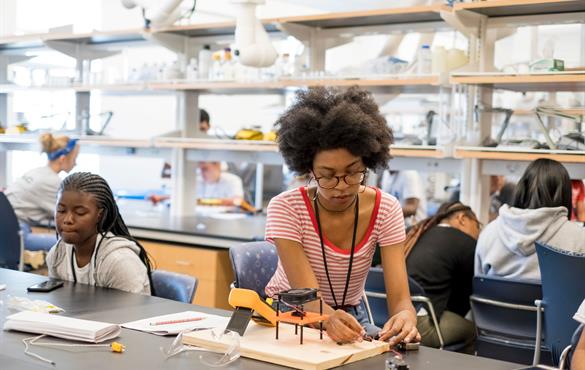McKelvey Engineering to host summer research program in thermal management
Undergraduate students have the opportunity to learn about thermal management in a new summer research program at McKelvey Engineering

Undergraduate students interested in learning more about thermal management research will have the opportunity to participate in a new summer research program at the McKelvey School of Engineering at Washington University in St. Louis beginning in the summer of 2019.
The Research Experience for Undergraduates (REU) Site program, Thermal Management on Multiple Scales, is supported by a three-year, $367,000 grant from the National Science Foundation. It is designed for rising juniors and seniors from academic institutions where research opportunities in science, technology, engineering and math (STEM) are limited and will include 50% women and 30% of students from groups traditionally underrepresented in the STEM fields, including those with disabilities.
Emily Boyd, principal investigator and teaching professor in the Department of Mechanical Engineering & Materials Science, said this program is unique because it appeals to the interdisciplinary nature of heat transfer and will provide a diverse group of mentors who are in the departments of Mechanical Engineering & Materials Science and of Energy, Environmental & Chemical Engineering.
"Our REU Site will immerse students in cutting-edge, hands-on research in the thermal sciences, which addresses some of the world's greatest challenges, ranging from the very small —nanofluids, nanoscale surface enhancement, and micro-heat exchangers — to the very large —carbon capture and storage," said Boyd, who also is director of the Washington University Summer Engineering Fellowship program designed for underrepresented minority students. "The projects will be categorized by scale: microscale, component scale, and systems scale."
During the 10-week program, students will begin with a four-day heat transfer boot camp taught by Boyd and J. Mark Meacham, co-principal investigator and assistant professor of mechanical engineering & materials science. Participants will then complete research projects with one or more of nine McKelvey Engineering faculty mentors, including Boyd and Meacham. Students also will meet with McKelvey Engineering faculty members weekly for lunch, participate in research skills workshops, information sessions on engineering graduate school and weekly social activities. The program also will be enhanced by tours of local research facilities and, students will attend presentations by engineers from industry.
In addition, students will serve as teaching assistants for an engineering course for students in the university's College Prep program for local high school students from underserved backgrounds. The experience will end with a research symposium, where students will present their research.
"This program seeks to take students who have an interest in engineering and give them the skills, tools and confidence they need to pursue engineering graduate school and careers," Meacham said.
Two participants in the program will be selected to present their summer research at ASME's International Mechanical Engineering Conference and Exposition or AIChe's Student Conference the fall after the program ends.




